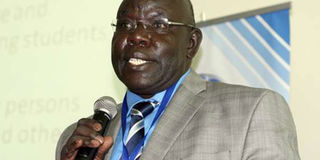Science degree students to pay higher fees in new varsity plan

Commission for University Education CEO David Some addresses participants during the Harmonization of Standards in University Education Workshop at Panari Hotel on March 7, 2016. Prof Some told a conference on higher education in Cape Town on April 5, 2016 that some courses will attract higher fees compared to humanities and social science clusters. PHOTO | ROBERT NGUGI | NATION MEDIA GROUP
What you need to know:
- Government study loans will be based on the kind of courses the students are registered for while lecturers will be paid according to what they teach.
- President Ameenah Gurib-Fakim of Mauritius called for increased investment in science and technology in higher education and programmes that encouraged more female participation.
University students will soon be charged fees according to the nature of the degrees they pursue.
Commission for University Education Chief Executive David Some told a conference on higher education in Cape Town that courses such as medicine, dentistry, architecture and engineering - which require expensive learning materials - will attract higher fees compared to humanities and social science clusters.
Also, Government study loans will be based on the kind of courses the students are registered for while lecturers will be paid according to what they teach.
Prof Some said Kenya’s funding model had remained unchanged for two decades yet costs of learning and living conditions had increased calling for a new unit-cost financing model.
For the past 20 years, all students registered in the regular programmes are given a grant of Sh120,000 annually irrespective of the courses they take, yet the degrees require different materials and resources.
This has resulted in a funding shortfall reflected in insufficient teaching and learning facilities, poor pay for academic staff and low levels of research.
The situation has pushed universities to admit large numbers of fee-paying students under the parallel degree programmes so as to generate revenues.
“Our universities are facing a huge challenge of high enrolment against insufficient facilities making it difficult for them to offer quality teaching and learning, and produce graduates who can compete at the global level,” Prof Some said.
He added that the problem was not peculiar to Kenya but was manifested throughout Africa, a continent that contributed less than two per cent of global research output and even less of patents.
Prof Some represented Education Cabinet Secretary Fred Matiang’i during a ministerial panel discussion at Going Global on Thursday.
WOMEN AND EDUCATION
The conference, organised by the British Council, was attended by ministers of education, vice-chancellors, university leaders, scholars and development agencies.
President Ameenah Gurib-Fakim of Mauritius called for increased investment in science and technology in higher education and programmes that encouraged more female participation.
She said Africa’s capacity to influence global economics and trade depended on the quality of higher education it offered its youth.
“Africa’s youth bulge must be harnessed through greater public investments in basic education, tertiary education, particularly in science, technology engineering, mathematics, vocational skills and innovation to build a valuable base of human capital,” said President Gurib-Fakim.
She spoke of the huge economic losses accruing from locking women out of education, saying: “Most of the women in Africa cannot afford not to work. But when they do, they are mostly employed in informal activities.
“We all know what this means: Low productivity, low incomes, low prospects.”




